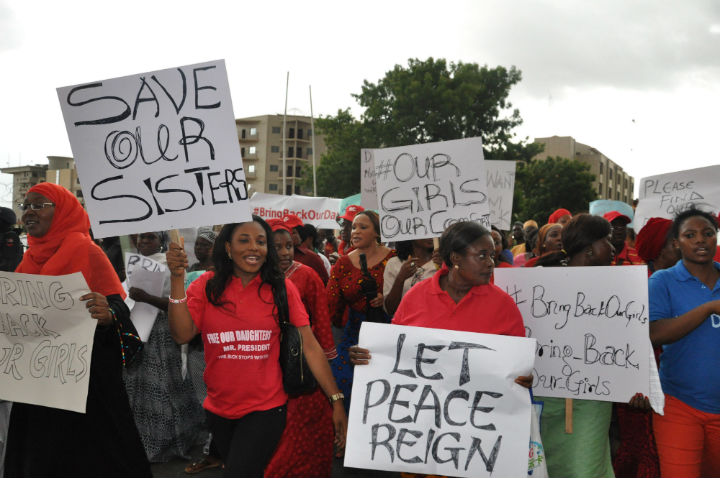*This story was updated on Friday, May 2 to reflect new details about the number of girls kidnapped.

Canada’s foreign minister added his voice Thursday to those expressing concern over the fate nearly 300 Nigerian school girls who were kidnapped last month.
Although no group has claimed responsibility for the Apr. 14 mass abduction of teenage girls in the northern town of Chibok, it’s widely believed the Islamic insurgent group Boko Haram is behind the kidnappings.
Foreign Minister John Baird blamed and condemned the group for what he called an “absolutely repugnant” act.
Canada labelled Boko Haram a terrorist organization in Dec. 2013 and, under the Criminal Code of Canada, prohibited membership in the Jihadist group or the transfer of money to support it.
“We are concerned about the safety and wellbeing of these girls, including recent reports that suggest they may be forced into marriage by Boko Haram,” Baird said Thursday.
He was referring to reports that emerged earlier this week, in which a chief elder in Chibok claimed the girls may have been sold as brides to Boko Haram members for the equivalent of CDN $13 (2,000 Nigerian naira).
The elder also claimed there were reports some of the girls had been taken over Nigeria’s border and into neighbouring Chad and Cameroon.
Baird said Canada is committed to putting an end to “the practice of child, early and forced marriage.”
READ MORE: Kidnapped Nigerian girls may have been taken abroad, leader claims
Frustrated and fearful parents of the missing girls marched in the streets on Wednesday to demand more effort be made to rescue their daughters. Other protests took place in the capital Abuja and Kano, the second largest city in Nigeria.
“We are pleading for others who are outside… to please come and help us, because the burden is too much for us parents,” an unnamed mother in Chibok said in an interview with BBC on Wednesday.
An online campaign, using the Twitter hashtag #BringBackOurGirls has also garnered attention for the plight of the missing girls.
There has been much confusion over the number of girls that were originally abducted and how many remain missing. Police in Borno State now report more than 300 girls were taken from the Chibok Government Secondary School in the early hours of Apr. 14 and 276 are still being held captive.
READ MORE: Nigeria police: 276 abducted girls still missing
Last week, a group of parents took matters into their own hands and searched parts of the nearby Sambisa Forest — where Boko Haram is believed to have hideouts – in an attempt to locate and rescue the girls.
Boko Haram formed in 2002. But in the past five years it has become more violent, carrying out a string of abductions and deadly attacks, mostly in northern regions of the country.
According to The Associated Press, there have been at least 1,500 deaths as a result of Boko Haram-related violence this year alone. It’s estimated Boko Haram has killed as many as 10,000 people since 2002.*
The name loosely translates from the Hausa language to mean “Western education is forbidden” or “Western education is a sin.”
“Boko” is a term that has come to signify the “Western,” while “Haram” means “forbidden by Islamic law.”
Boko Haram’s leader Abubakar Shekau appeared in a video in the days following the mass abduction, but he made no reference to the kidnapping.
But he did say, “Everyone that calls himself a Muslim must stop obeying the constitution, must abandon democracy, must stay away from Western education.”
According to BBC, Shekau threatened in May 2013 to treat captured women and girls as slaves.
With files from The Associated Press
*CLARIFICATION: An earlier version of this post state it’s estimated Boko Haram has killed as many as 10,000 people since 2009. That estimate is the number of people Boko Haram is believed to have killed since 2002.




Comments